Paris Mosaic: meet Christophe Vasseur of Du Pain et des Idées
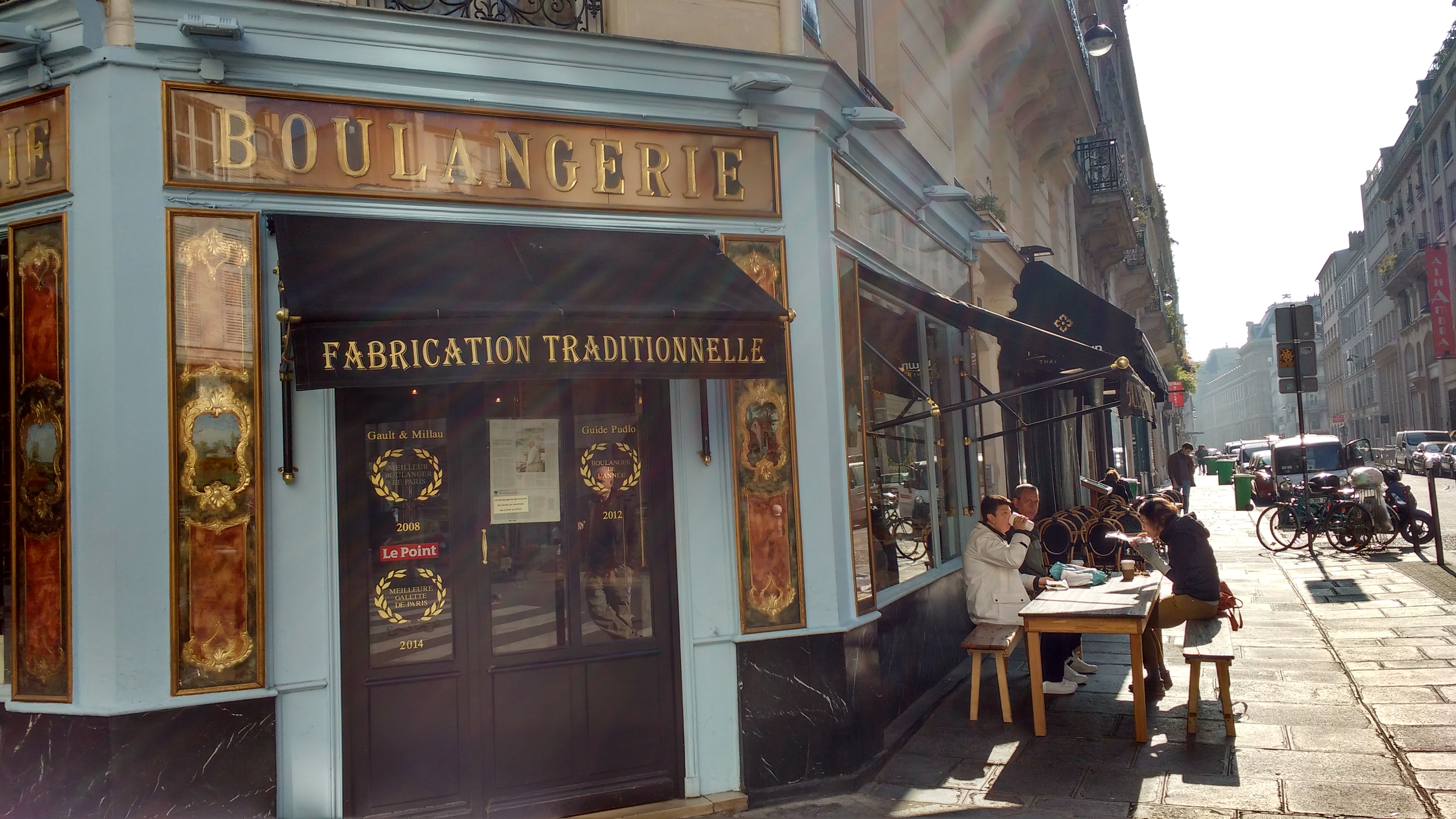
There is so much more to Paris than its famous monuments. In fact, one of the things we at MyFrenchLife™ love most about the City of Light are the beautiful artisan businesses that line the city’s streets.
In our view these small businesses and the passionate people behind them are exactly what give Paris its magic and unique charm: les fleuristes, boulangeries, patîsseries, fromageries, et bien sûr, les chocolateries.
Enchanted by their beautiful displays and inspired by their talent and dedication, we’ve brought together the Paris Mosaic series, where we introduce you to the faces behind these Parisian gems.
Amusez-vous !
Du Pain et des Idées
Address: 34 rue Yves Toudic, 75010, ParisOpening Hours: Mon – Fri, 6.45am – 8.00pm
Métro: République or Jacques Bonsergent
Christophe Vasseur’s Du Pain et des Idées is the artisan’s artisan boulangerie. Keeping traditional methods alive like no other baker in Paris, stepping into the shop is like travelling back in time.
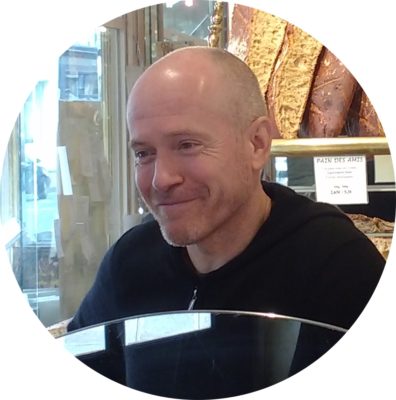
Charismatic Vasseur is a purist when it comes to methods of making bread. Horrified at the back-door industrialisation of even the quaintest looking bakeries, he reveals the extent to which the profession of artisan baking is under attack in France.
Formerly working in the world of fashion, when it comes to tastes, he’s not such a traditionalist. He incorporates flavours like orange blossom and pistachio as well as his own signature bread variety at Du Pain et des Idées.
Meet this artisan baker in Paris.
Is this a family business? And how long has it been operating? How did it begin?
Du Pain et des Idées has been operating for 14 years, and it all started by buying a bakery on 34 rue Yves Toudic which was going bankrupt, I bought it and I transformed this place. For me, it had many hidden secrets and it has a unique decor because it is classed as a historical monument, dated 1865. For me, it’s a theatre, a place with a lot of history, and that’s really important because my approach is rooted in the tradition of perpetuating something that has disappeared these days.
You’ve got so many boulangeries in Paris, but very very few who do what I do at Du Pain et des Idées: we work using very high quality primary ingredients, letting the dough ferment (rise) for a long time and cooking the products for a long time. This method is a lot more time-consuming than everyone else’s, but at the same time these processes have been used for three generations already.
So effectively, Du Pain et des Idées is a trip to the past. You could say that it’s 100 years old, even the products are 100 years old because everything we make here is how people made it a century ago.
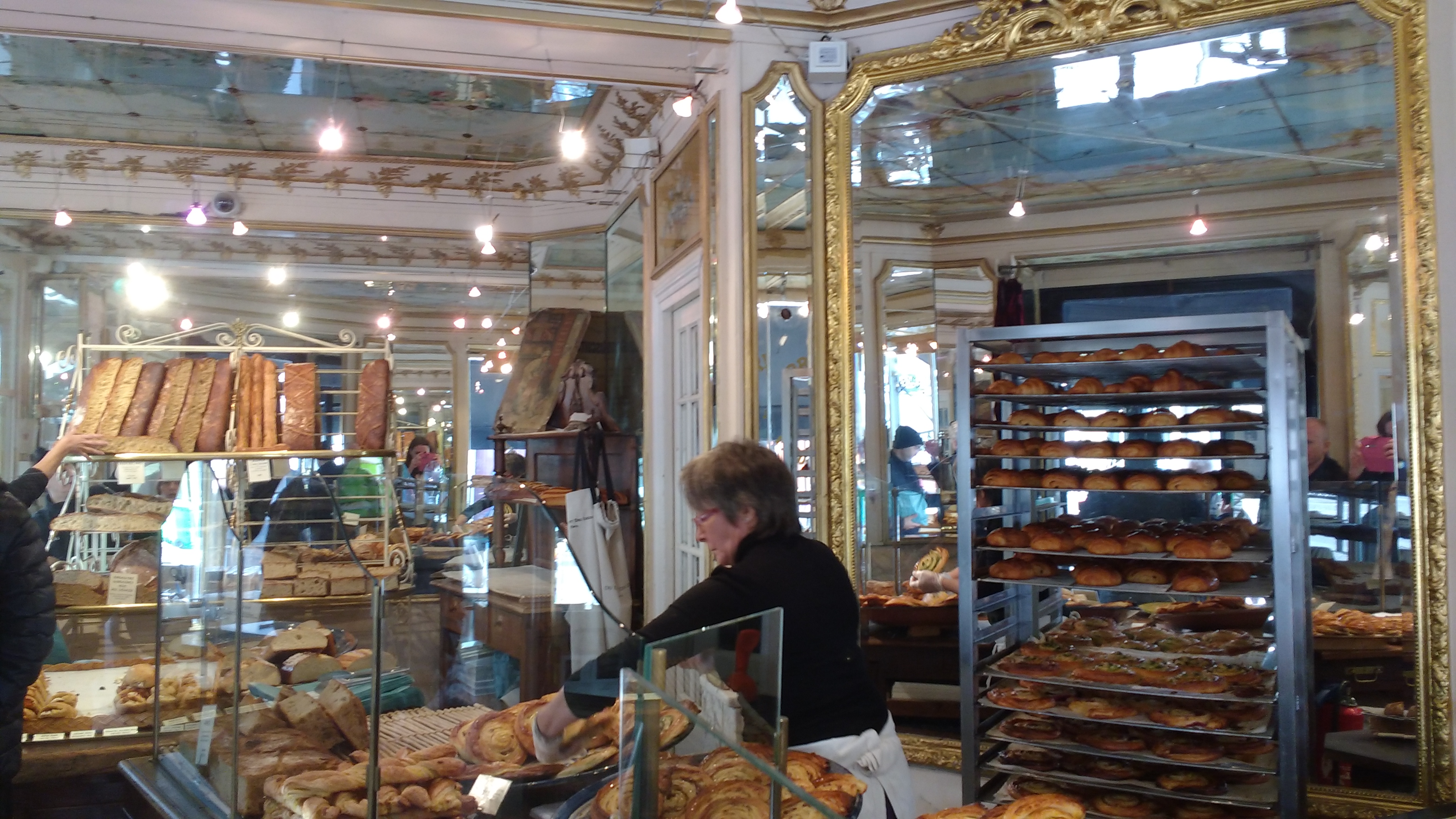
And the name, ‘Du Pain et des Idées’, where does that come from?
Voilà it’s to express just that idea, that is to say that, ‘le pain’ is the link to tradition, and ‘les idées’, is the curiosity and innovation of this business. This is a different approach to all of my contemporaries up to now.
So it’s a bit of a return to origins and at the same time a bit of what is called ‘retro-innovation’: retro because it’s old, and innovation in the sense that you do it differently. It’s not new ideas, you take ideas from the past and bring them back into play.
Could you describe a typical day in your bakery?
That depends if I have enough staff or not, that’s to say that if everyone is present and in their role I come in like a big fat capitalist exploiting the proletarian labour. I arrive at 9am after dropping my kids off at school and I stay there until 9pm. This is when I’m managing the workday in the bakery. On the other hand, if I have to replace people on the production side, I arrive at 2am and I work until 9am, but luckily, it’s very rare that that happens.
Being an artisanal baker, people have a very picturesque idea of that life; does the reality correspond to this idea?
I can’t speak for everybody, but for me the reality goes beyond my wildest dreams, beyond all my hopes. Yes, there is a reality that’s a little, I wouldn’t say hard, but a bit tiring.
If you start your own bakery and don’t have enough money to hire people, it’s you who does all the jobs: production, sales and when you’re making bread, production starts very early in the morning, 2.30am.
In the beginning, you have to work phenomenal hours, working from 2.30am to 9pm, at least five days a week. If you open only five days a week, the sixth day you catch up on everything , and on the seventh day you do administrative things, you never rest. It’s like in all businesses in the first six months or year, you never stop working. Even in the moments when I was working at night, I was always grateful for this job.
I even found that there was a real dignity, a real poetry to being an artisan. Like others in this business, I am a creator, a bit like in the world of fashion where I used to work.
Du Pain et des Idées allows for creative freedom that few careers allow. You can choose to do the same as everyone else, or you can say: “I’m going to make a croissant that you can only find at my bakery”.

But I think that few professions have as many rewards: the pleasure of creating something, the satisfaction of selling something healthy to customers that will put a smile on their face, something which stands out from the crowd.
People in France will cross the arrondissements to buy good bread because they are viscerally attached to it.
Perhaps it’s because of our culture that we see it as something sacred, we spend time at the table, we talk about everything and nothing.
Going to a restaurant isn’t just for eating, but for that unique moment when you share a meal with others. So, the bakery allows for all of this, and in that sense I think it’s an unknown trade. People don’t expect all the richness and the beauty that’s in this job.
What qualities does an excellent baker need to succeed and excel?
The number one quality is an instinctive understanding of fermentation. That’s not given to everyone, there are people who will never understand it. There are some people who have the talent to look at a brioche dough that’s rising, and a bread dough that’s rising, and know in an instant what’s going on inside it. Professional baking should only be practised by those who have this particular talent.
After that, people with this talent need to work, work, work. In order to make a career out of it you have to be efficient and fast, but fundamentally, you need the understanding. Why? Because the key to the quality of bread is the fermentation.
Yes, there’s the quality of the ingredients, but as with wine, everything comes into its own during fermentation and a little at the cooking stage, but fermentation is key. Bread dough is like a wild animal. It evolves as the atmospheric pressure changes. Adding chemicals means that the products will come out the same every day; however, you lose the fine details of the aromas, and the health benefits too because the chemicals are unhealthy and difficult to digest. This is not the type of bread that I make at Du Pain et Des Idées.
I would say that the basic talent; the understanding of fermentation, is the most important.

That’s an immense question, we could talk for hours about that. You could say that we’re attached to bread because of our Judeo-Christian identity, but Anglo-Saxons aren’t as attached to bread as us.
I have a few different tracks of thinking about it: French gastronomy had an unprecedented success in France because we had the luck to have some gastronomic geniuses and importantly, we had kings who honoured those who could create exceptional food.
We saw this in Russia with the Tsars and a little in Italy too, but especially in France, by cultural hazard or what, I don’t know.
I think that we are pleasure-seekers. We love the fundamentals in life, the beautiful things: beautiful women, beautiful objects, we love to eat well and live well. We are a population like the Italians, Latin in the base. We like to make the most of life, and the table becomes, for us, not a place to eat, but a pretext of eating in order to communicate with others.
That’s why the dinner table is your whole life. The English have the pub, us French have the table. But I think that it’s exactly the same thing for them, they go on the pretext of drinking a beer to actually go and discuss and meet with people.
And ‘le pain des amies’, is the name based on this idea of talking with friends?
Yes exactly. Why? Because le pain des amies is originally the bread that I used to make on the weekends for my friends. We’re always closed on weekends and I use Sunday to invite my friends to my table. It’s a particularly complex bread, you leave the dough to rise and ferment for several days and then cook it for one hour.
And so my friends would visit me during the week at Du Pain et des Idées and ask: “Why can’t I buy the bread like you baked on Sunday?” It’s now on famous tables like in the Hotel Maurice – Didier cheese with the bread of Christophe Vasseur – that for me is a great honour. This bread is so unique that no one else has been able to do what I do; the great chef Alain Ducasse sends someone every day to collect some bread from me at Du Pain et des Idées.
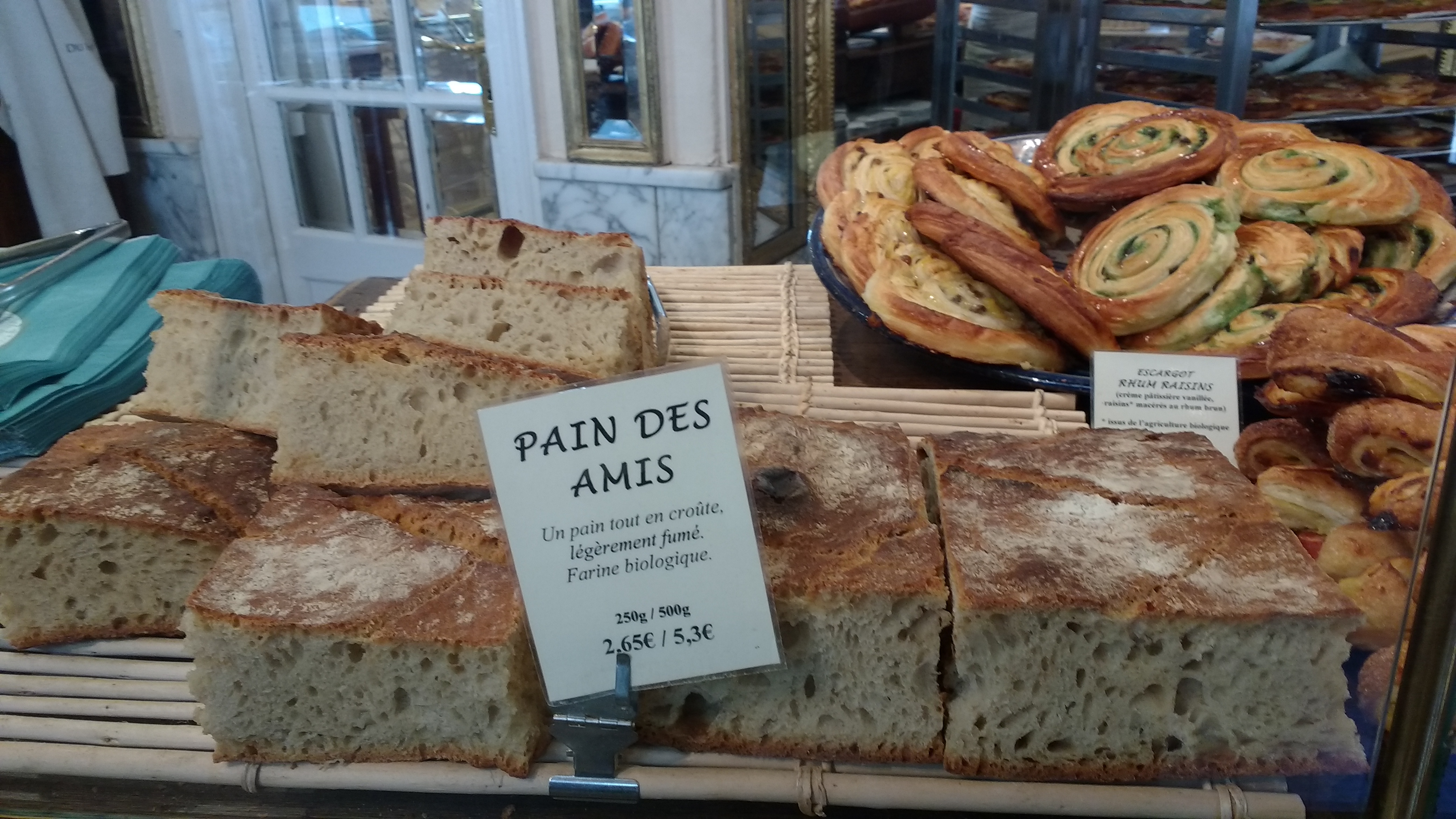
You’re a boulangerie á l’ancienne, so what’s the difference between a traditional bakery and a modern bakery?
I would say that the difference, firstly, is the range of products. In a traditional bakery, there’s only bread and viennoiserie. In a modern bakery, there are pastries, meats, salads, drinks and sometimes even sweets and chocolate. This is a recent change; the boulangerie-patisserie only came about in the 60s. The problem is that the pastry chef can make super macarons but will have trouble with croissants, and vice versa, a baker can’t make really good pastries.
The second point is the approach in terms of the quality of the product. In order to do everything, and with limited space, most bakeries resort to pre-made products: ready to use crème patissiere, ready to bake croissants. I would say that these are mediocre products.
You can’t pretend that they’re artisanal, an artisan sells very high quality products and nothing else. To be artisanal you have to make everything on site. In a modern bakery, you have everything, but nothing of exceptional quality. You can find the same paninis everywhere, the same salads with no seasonality. For me, that’s a catastrophe, but that’s how it is.
So what’s the future for bakeries?
The future isn’t easy in my opinion. There’s always a clientele for quality products, but the problem is that we don’t train bakers anymore. For example, croissant making is no longer taught in the training centres, the croissant is known around the world, yet in France, we don’t teach how to make it anymore.
There’s, even more, to say about the production of bread. Bread isn’t left to ferment for long enough and the industrial methods are so quick. To make bread now it takes three hours, while in the 60s and 70s it took 12 to 24 hours. At ‘Du Pain et des Idées’ it takes 48 hours.
There are three benefits to fermenting the dough for a long time: one, the taste; two, converting the fast sugar. Flour, whether it’s white or brown, is a ‘fast sugar’. By fermentation, it can become a ‘slow sugar’, but it needs at least 24 to 48 hours. The third benefit is the digestibility. All these gluten allergy problems have a real public health problem behind them. The flours that are used today are exclusively, or semi-exclusively, made from modern wheat. Where the gluten molecules used to be very small, now they are big. Without fermenting the dough, the gluten molecules stay intact, but if you ferment it, the process breaks down the molecules and the gluten becomes digestible.
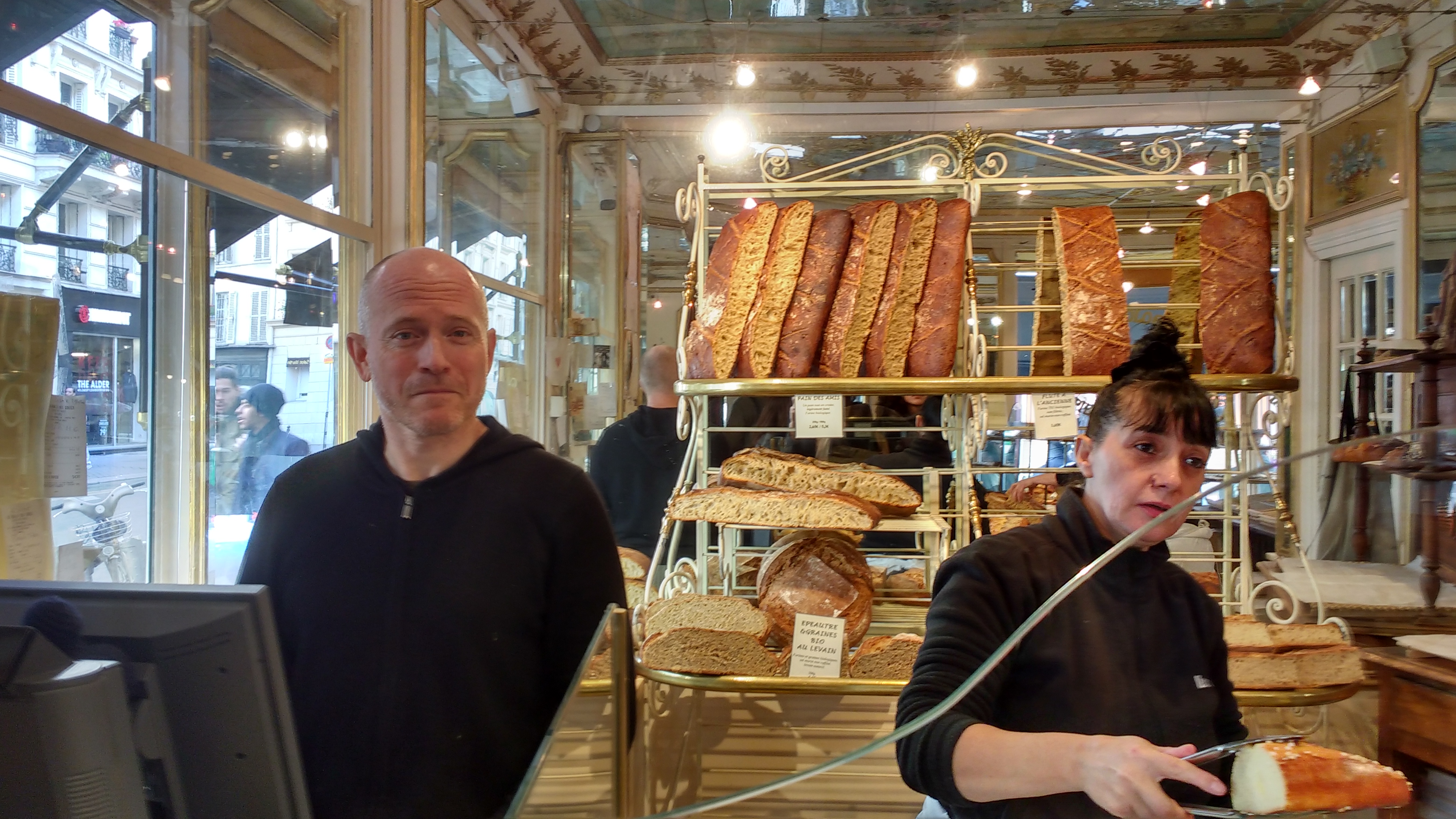
So someone who says they can’t eat gluten can eat the bread at Du Pain et des Idées?
They should try it yes. Every day I talk to people who have tried my bread and they discover they can eat bread again. It’s partly because I ferment it for a long time, and partly because I use organic flour. There are more and more food allergies today because our diet is so saturated with chemicals and this provokes a general inflammation of the digestive system. A small percentage of people will then become allergic and have to take pills, which are sold, incidentally, by the same laboratories as the companies who sell the pesticides in the first place. It’s cynical, but that’s what’s happening.
So let’s talk about the products, what are your three most popular products?
The first is, of course, the pain des amies. I think that it was the Wall Street Journal who said my pain des amies had a “cult-following”. Number two is the chocolate and pistachio swirl; it’s croissant dough rolled with crème patissiere, pistachio and chocolate drops. Number three is the orange flower brioche.
Which is your favourite? And which is the most difficult to make?
They’re all technically difficult to make because they all take a long time. I don’t have a particular preference but I would say that my two favourites are the pain des amies and the chocolate pistachio. To be clear, I only sell products in Du Pain et des Idées that I like to eat and make.
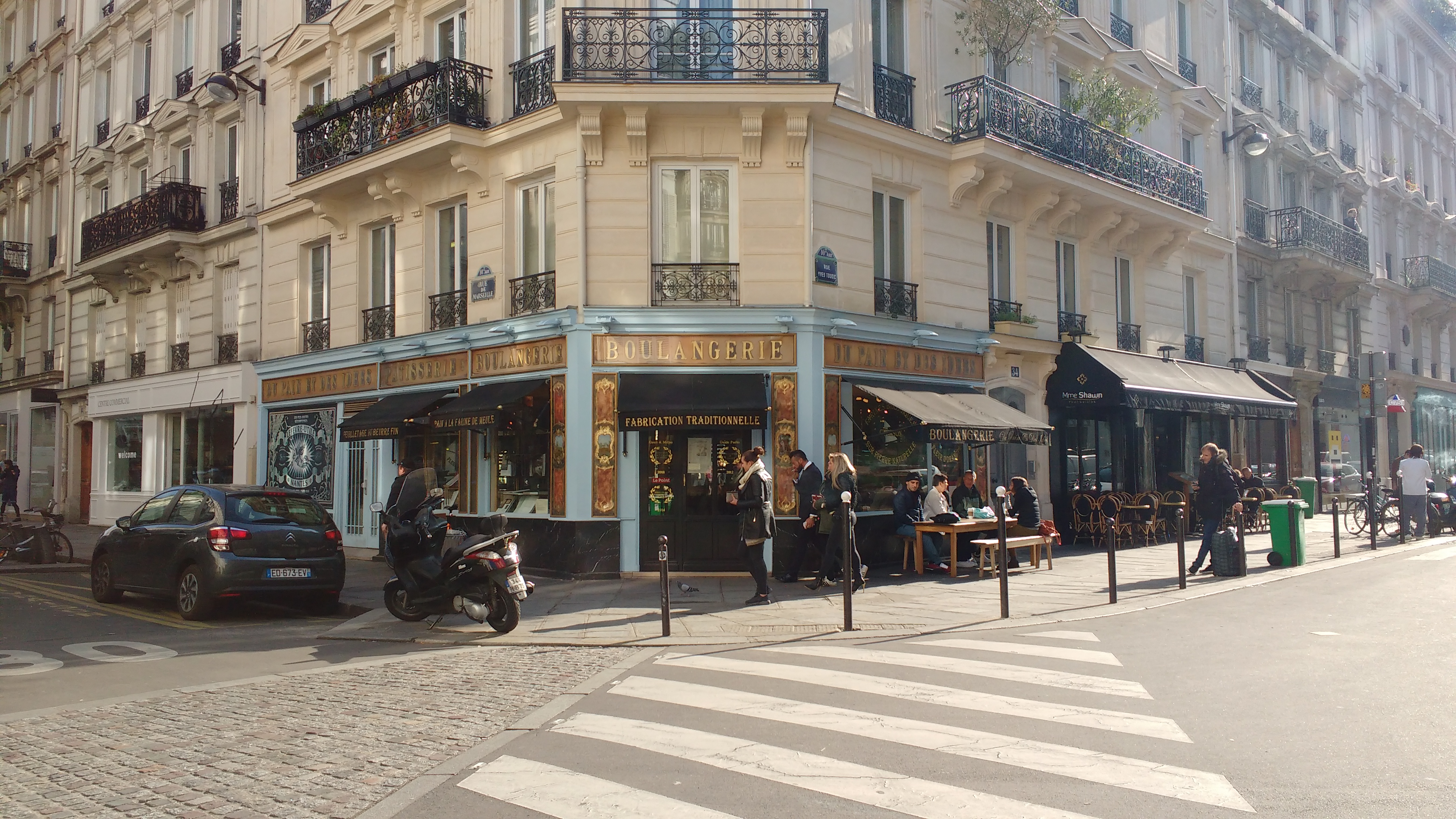
Do you have any specialities, particular to Du Pain et des Idées? Is there something that people really seem to come back for? Why do you think this is?
It’s definitely the pain des amies and the orange flower brioche because I’m the only artisan baker in Paris to make these two products. There are people who copy me, someone in the 19th copied my range, but it’s like with Vuitton bags, copying isn’t too much of a problem because it’s only a pale imitation.
At the end of the day, what do you do with the rest?
There isn’t any. Perhaps there will be a few odds and ends which I’ll offer to my staff, or if a client comes in five minutes before we close and there’s something left I might say “oh here you go, take it”.
I see you’ve written a book, could you talk a little about that?
I needed to testify; I have a fear of dying soon. I would say that I needed to leave something behind, leave a trace, a direction. But it’s a testimony of my view of the profession, especially the occupations linked to bakeries which are totally unknown.
For example, the farmers growing the wheat, it’s illegal to reuse the leftover grains to plant the next year’s crop. For centuries, farmers have worked like that, naturally choosing the varieties which are adapted to their land. Every year there would be some wheat, maize or grain to replant the next year and now it’s illegal. Today, you are only allowed to buy modern varieties grains from the catalogues of the laboratories. You have to pay, and they sell sterile grains.
For me, it’s Orwellian what’s going on today. The press doesn’t say a word so nobody knows. Take another example, modern apples, treated with pesticides, have 50 times less nutritional value than organic apples. People say “organic apples are so expensive”, but it’s the industrial apple that’s expensive because you’re participating in the reduction of biodiversity, you’re poisoning yourself and you must eat 50 times more to get the same nutritional value.
So there you have it, I try to warn people: wake up, realise. What world do you want to leave for your children?
And finally, to end on a lighter note, where do you like to eat, drink and relax in Paris?
To eat: Matière à
To have a coffee: DonAtónia Pastelaria
To relax: with my friends, at my table.
Do you agree with Christophe that modern food production uses too many chemicals? Do you prefer to eat ‘bio’? Share your opinions with us in the comments box below.
Introduction // Le Furet Tanrade // Thalie // La Petite Chocolatière // FJ Fleuriste // Boulangerie Bruno Solques // Rêve // Fromagerie Goncourt // Au-delà des Prés // Le Grenier à Pain // Au nom de la Rose // Boulangerie des Artistes // Les Fleurs d’Aline
Images © Rose Trigg






